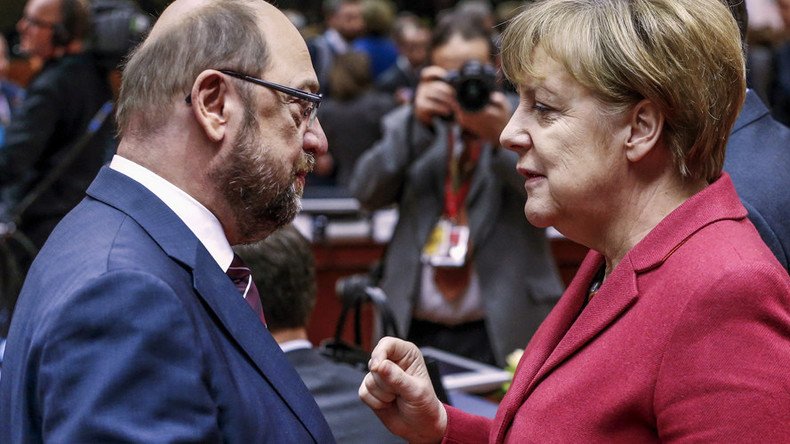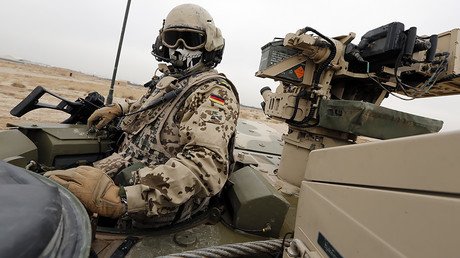Germany: Caught between America and Russia again

Since Willy Brandt made Egon Bahr’s “Ostpolitik” official government policy in 1969, Germany's leaders have been divided. Some want closer ties to Washington, and others demand a common European home with Russia.
As voters prepare for the polls, the debate has kicked off again.
Over in Berlin, they’ve been enduring an election campaign so tedious that American media outlets are making its very dullness the story. Last week Quartz chuckled about how “Germany’s election campaign is a snooze” and The Wall Street Journal’s news-peg was “Stunning Plot Twist in Germany’s Big Election: Wow, It’s Boring.”
READ MORE: No regrets: Merkel defends open-door policy as election draws near
Unlike last year’s US Presidential contest, there are few fireworks and little showbiz. Instead of something like Donald Trumps “Make America Great Again” slogan, Angela Merkel’s CDU is using “für ein Deutschland in dem wir gut und gerne leben (for a Germany in which we live well and happily)” which hardly rolls off the tongue. And their SPD opponents, led by Martin Schulz, aren’t channeling Hillary Clinton’s feistiness either with “Die Zukunft braucht neue ideen. Und einen, der sie durchsetzt (The future needs new ideas. And someone who implements them).”
The fact both realistic candidates for chancellor have so much in common removes the scope for the usual political jousting. Both are liberals who favor a strong European Union under Berlin's leadership. And Schulz appears to broadly support Merkel’s 2015 decision to open German doors to millions of migrants.
East-West choices
However, one subject has emerged to divide the pair: Germany’s relationship with the United States. And, as a consequence, Berlin’s attitude to Moscow is also in the spotlight. So far, the CDU is sticking to the pro-sanctions agenda favored by its leader, but SPD figures are more open to dialogue with the Kremlin.
To further complicate matters for Merkel, the leader of her preferred future coalition partners, the Free Democrats (FDP), has called for Germany to change its policy toward Russia and tacitly accept the Kremlin’s reabsorption of Crimea. “The security and prosperity of Europe depend on its relationship with Moscow,” Christian Lindner believes.
These issues injected some life into the humdrum campaign when Schultz began to harangue Merkel for proposing an increase in military spending of around €30 billion. Something the SPD leader painted as meek acquiescence to Donald Trump’s demands that NATO members spend two percent of GDP on their armed forces.
But last week, the former Eurocrat went further, stunning Germans by saying: “as chancellor of the federal republic, I will campaign for the removal of nuclear weapons on German soil.” He later tweeted that “the upper limit for nuclear weapons in our country must be 0.”
A few days later, Sigmar Gabriel, the former SPD leader who is currently the Foreign Minister in Berlin’s grand coalition, also brought up the Russian issue. Warning that Germany needed to avoid a new “ice age” in relations between Russia and the West, he chided Washington over fresh sanctions it recently imposed on Moscow. “We don't want to completely destroy our business relations with Russia, especially in the energy sector,” he explained.
Frau ja?
Thus, Merkel is in a pickle. All credible polls indicate her CDU will remain the largest party in the Bundestag. But she’s going to have to rule alongside a junior governmental partner which either disagrees with her consistent hostility to Russia (the FDP) or wants to end Berlin’s subservience to American military interests (the SPD). And this feeds into a broader debate about where Germany stands in relation to Moscow and Washington.
Partly because the country lacks the kind of 'deep state,' which exists in Britain or the US, the German compass has oscillated ferociously. Like his predecessors, Brandt and Helmut Schmidt, Gerhard Schroeder, was keen on close ties with Moscow. But Merkel reversed this course, eschewing the relative neutrality of her CDU mentor Helmut Kohl and exhibiting clear Atlanticist sympathies. Furthermore, her hostility to Russia seems rooted in her East German childhood.
Her contempt for Donald Trump is obvious. Something shared by the vast majority of Germans, who also abhorred George W Bush and came to perceive Barack Obama as a huge disappointment.
And then there’s the espionage elephant in the room. In 2013, it was revealed the US National Security Agency (NSA) had been systematically spying on Germany for years and had even wiretapped Merkel’s phone. Other issues souring relations are American use of drone warfare, the failure to close Guantanamo Bay and the US attempt to impose the Trans-Atlantic Trade and Investment Partnership (dropped by Trump) despite massive German resistance.
Of course, Germans have many concerns about Russia too. They fear its size and military power. And they regard it as illiberal and undemocratic, even if Schroeder indicated he believed Vladimir Putin to be a “flawless democrat” in 2004. However, both countries have given Europe much of its high culture, art and political philosophy, and these prevailing bonds unite their people in a common ground which surely seems alien to Americans.
Nobody is suggesting that Berlin is suddenly going to rush into Moscow’s outstretched arms and create a strategic partnership. But, with German affection for America evaporating, there exists a chance for Russia to persuade even hardline Atlanticists like Merkel. Something which will concern Washington, because, as Stratfor’s George Friedman has outlined the “US government considers to be its overriding strategic objective the prevention of a German-Russian alliance.”
The statements, views and opinions expressed in this column are solely those of the author and do not necessarily represent those of RT.















